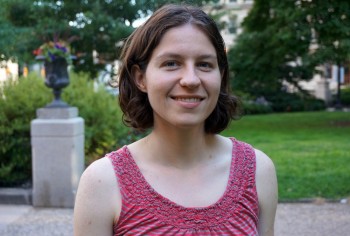Jessie McDonald '06

Details
Jessie McDonald '06 has found a way to combine her interests in English, science, and music through science radio journalism. "I kind of wish I could just go back to college and take classes all the time, so this is like my version of that," McDonald says. "I create my own curriculum."
At Haverford, McDonald double majored in biology and English and wrote and edited for The Bi-College News. She developed her interest in immunology while studying with Professor of Biology Jennifer Punt, who encouraged her to pursue a graduate degree in the subject.
Though McDonald initially saw herself following in Punt's footsteps and becoming a professor, she gradually realized she had a strong interest in writing about science in lieu of teaching it. While pursuing her Ph.D. in immunobiology at Yale University, she became a science and technology columnist for The Yale Daily News and an editor and writer for The Yale Journal of Biology and Medicine. She attended a panel on science writing at a graduate student conference about alternative careers; she decided to take an undergraduate course in science journalism with Carl Zimmer. When she was out of the lab, she found herself reading The New York Times—especially the science stories.
Finally McDonald decided to pursue her interest in science writing as a Mass Media Fellow with the American Association for the Advancement of Science (AAAS). During the 10-week summer program, she wrote and produced radio stories for KUNC, an NPR member station in Northern Colorado. McDonald tailored her reporting to local interests like craft beer (molecular profiles of barley) and rock climbing (applied chaos theory).
"In my mind," McDonald says, "I was kind of thinking, 'What's a great way to get people to realize they like science when they don't even know they're consuming it?' "
Since January 2014, she has been working as a health reporter for WHYY in Philadelphia, writing and producing one-minute radio spots. She will soon begin writing three- to five-minute features, which will allow her to dig deeper into her subjects and incorporate environmental sounds from field reporting.
McDonald says she stays passionate about science writing because she is able to witness the excitement of researchers and communicate that excitement to a general audience. She hopes that her stories will help promote science literacy and guide people towards making more informed decisions.



